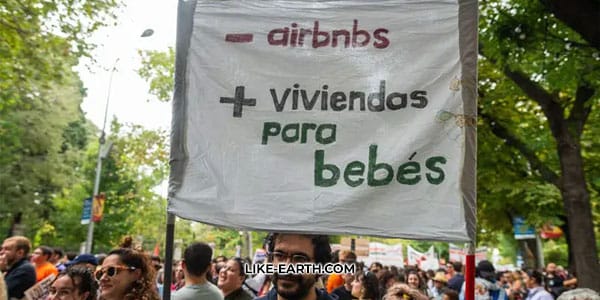Spain Orders Airbnb to Remove Over 65,000 Tourist Rental Ads

Spain orders Airbnb to remove over 65,000 tourist rental ads as part of a sweeping crackdown on unlicensed short-term accommodations that are driving up housing costs in major cities like Barcelona and Madrid.
On Monday, Spanish authorities announced new measures to tackle the surge in unregulated tourist rentals. This bold step targets Airbnb and similar platforms, demanding the immediate removal of over 65,000 listings that fail to meet legal requirements.
Government’s Bold Move to Curb Illegal Rentals
The Ministry of Consumer Affairs issued a formal notice to Airbnb, stating that the affected listings do not comply with regional housing laws. The majority of these properties are based in urban centers where local governments have expressed concern over housing shortages and rising rents.
Spain’s minister for consumer protection, Pablo Bustinduy, explained: “We are acting decisively to protect local communities. Platforms must respect the laws of this country.”
Airbnb Faces Compliance Pressure Across Europe
This move is not isolated. Across Europe, cities are reining in platforms like Airbnb that have disrupted traditional housing markets. From Amsterdam to Lisbon, governments are struggling to balance tourism benefits with long-term housing availability.
Spain’s action could become a model for future regulatory frameworks elsewhere. It reflects increasing frustration among residents, many of whom blame short-term rentals for driving them out of their neighborhoods.
Impact on Popular Tourist Cities
Barcelona, which has long battled over-tourism, is one of the hardest hit by Airbnb’s unchecked growth. Officials claim that over 10,000 of the removed listings are from the Catalan capital alone. These ads allegedly operated without proper licensing and in violation of local housing rules.
Madrid follows closely, with thousands more listings under scrutiny. Local authorities are working to verify which properties meet legal standards before enforcement actions begin.
What This Means for Hosts and Travelers
Hosts affected by the takedown may face fines or legal action if they continue operating without authorization. Meanwhile, travelers are urged to verify the legality of their accommodations before booking.
Spain’s official tourism website has published updated guidelines to help tourists choose licensed rentals. Travelers should ask hosts for license numbers and verify listings on government platforms.
Airbnb’s Response to the Spanish Government
Airbnb responded with caution, stating that it is reviewing the government’s request. A spokesperson said: “We remain committed to working with Spanish authorities to ensure compliance while supporting local tourism.”
However, industry analysts believe that Airbnb will need to implement stricter controls to avoid further legal trouble in Spain and other European markets. Without such changes, the platform risks losing access to high-demand tourist destinations.
Public Reaction to Spain’s Crackdown
Many residents across Spain welcomed the news, calling it a necessary step toward restoring affordable housing. Social media platforms were flooded with support for the decision. Hashtags such as #FairHousingSpain and #StopIllegalAirbnb began trending on Monday morning.
Local advocacy groups, such as Barcelona Residents for Housing Justice, praised the move. “This is a victory for our neighborhoods,” said their spokesperson. “We’ve fought for years to get our city back from speculative tourism.”
Economic Implications for the Tourism Industry
While the crackdown is celebrated by residents, some business owners worry about the ripple effect on tourism revenue. Short-term rentals often provide flexible, affordable options for visitors—especially during peak seasons.
Hotel owners, on the other hand, may benefit from decreased competition. Experts predict a possible surge in hotel bookings as fewer short-term options remain available online.
Spain’s Broader Strategy on Housing and Tourism
Spain’s government has also introduced a broader housing reform package to support local renters. This includes tax incentives for landlords offering long-term leases and penalties for vacant property speculation.
The campaign aligns with the EU’s goal of promoting sustainable tourism while preserving local communities. European lawmakers have repeatedly called for a “common digital market regulation” to govern platforms like Airbnb.
Legal Framework and Compliance Timeline
Platforms have 30 days to comply with the removal order. If Airbnb fails to meet the deadline, Spanish authorities may impose financial sanctions and initiate legal proceedings. Other rental sites like Vrbo and Booking.com are also under review.
Spain’s consumer agency has published a searchable registry of approved rentals, giving tourists and residents access to verified accommodation listings.
What This Means for Future Travelers
If you’re planning to visit Spain soon, take extra care when booking your stay. Follow these tips to ensure compliance:
- Look for a visible registration number on listings.
- Check if the property is located in a regulated zone.
- Book through platforms that display licensing data clearly.
- Contact hosts to request legal documentation if unsure.
Staying informed will help you avoid unpleasant surprises, including last-minute cancellations or fines.
Looking Ahead: A New Era for Urban Tourism?
Spain’s clampdown signals a turning point for short-term rental regulation. As more cities join the movement, digital platforms will need to adapt or risk exclusion from key markets. Responsible tourism is no longer a choice—it’s a necessity.
This case could set legal precedent, empowering other countries to act decisively. It also calls for better collaboration between platforms and policymakers to build a fairer travel economy.
Final Thoughts on Spain’s Airbnb Decision
By ordering Airbnb to remove over 65,000 listings, Spain has taken a bold stance in defense of its communities. The country aims to strike a balance between welcoming tourists and protecting the right to affordable housing for its citizens.
As the global tourism industry evolves, governments and tech companies must find common ground to ensure that tourism does not come at the cost of community wellbeing.
Stay informed about international policy updates and responsible travel tips by visiting our main travel news hub. Spain Orders Airbnb
Join our WhatsApp news channel for daily headlines and breaking updates straight to your phone. Spain Orders Airbnb
Share This Article
Let your friends know about this exciting news!



